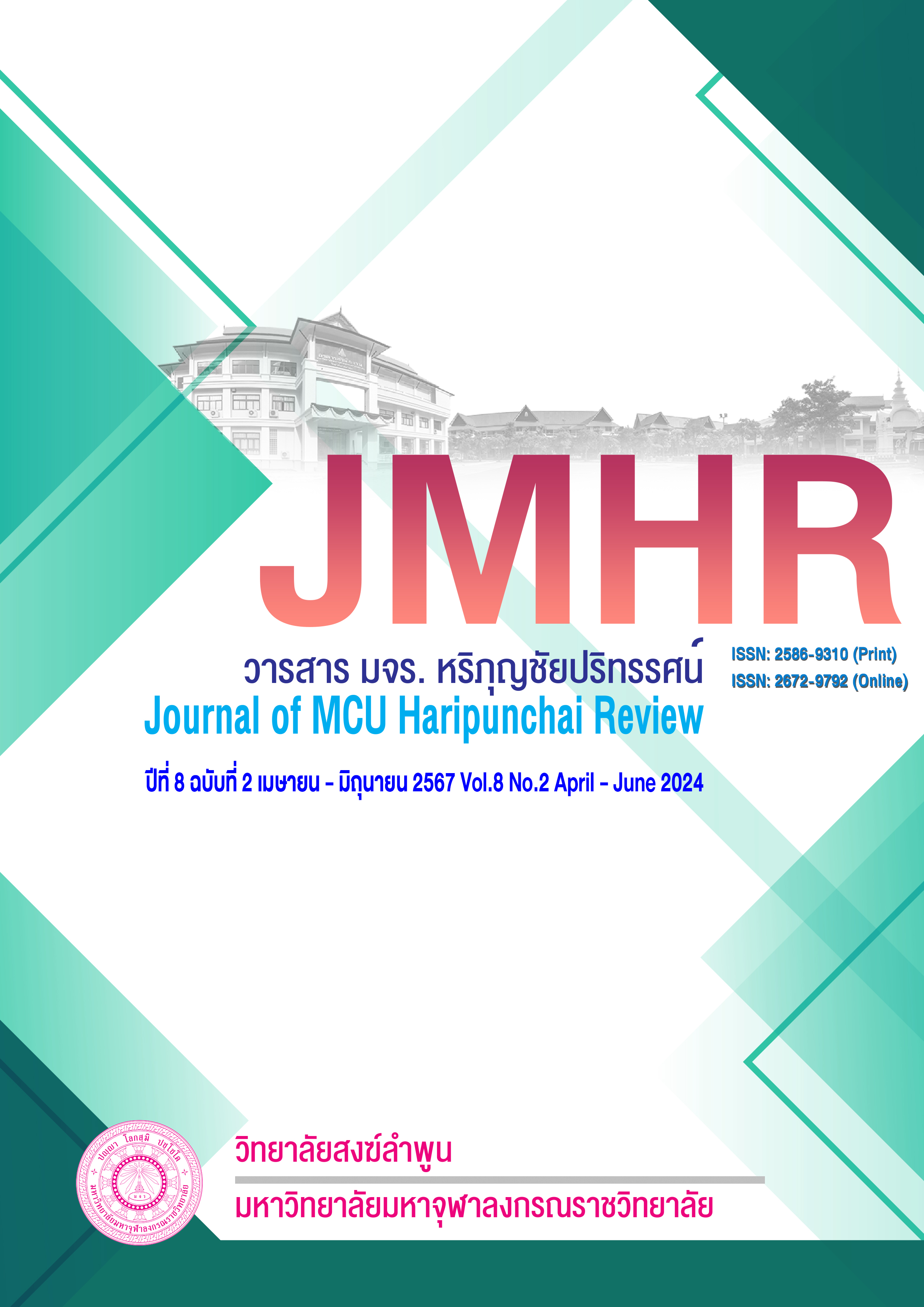Buddhist Integrative Knowledge Management of Nakhon Lampang Buddhist College Under Mahachulalongkornrajavidyalaya University
Main Article Content
Abstract
This research has the following objectives: 1) to study the opinions level on knowledge management at Nakhon Lampang Buddhist College, Mahachulalongkornrajavidyalaya University, 2) to study the relationship between Vudḍḥidhamma (virtues conducive to growth) and knowledge management of Nakhon Lampang Buddhist College, and 3) to provide guidelines for Buddhist integrative knowledge management. This study is mixed-method research; (1) quantitative research of which data was collected using a questionnaire from the research sample, 162 college students from Nakhon Lampang Buddhist College, and was analyzed by descriptive and inferential statistics by Pearson product-moment correlation coefficient analysis, and (2) qualitative research using in-depth interviews with 12 key informants. The obtained data was analyzed by synthesizing the content corresponding to the research objectives and will be presented further.
The research results were:
- the level of opinions of students towards each knowledge management at Nakhon Lampang Buddhist College, overall, was at a high level; namely, knowledge identification, knowledge access, learning, knowledge creation and acquisition, knowledge sharing, knowledge organizing, and knowledge codification and refinement.
- the relationships between Vudḍḥidhamma and knowledge management are positive and at very high levels; namely, on Sappurisaṁseva (r = 0.820**), on SaddhammasavanaI (r = 0.821**), on Yonisomanasikāra and Dhammānudhammapatipatti (r = 0.854**), overall, the relationship is at a very high level (R = 0.858**).
- the guidelines for Buddhist integrative Knowledge management of Nakhon Lampang Buddhist College are (1) Sappurisaṁseva : searching for sources of knowledge and people with expertise, creating the learning surrounding, understanding the conditions and problems that occur in the organization for the knowledge management process (2) Saddhammasavana : creating right understanding about the information, having opened-mind to learn any knowledge from communicators for increasing knowledge in many dimensions and reducing ego while listening for reasoning, as well as asking when in doubt. This includes recording new knowledge and practicing to gain complete knowledge,3) Yonisomanasikāra: reflecting, considering and analyzing new knowledge deeply 4) Dhammānudhammapatipatti: practicing the knowledge correctly with the best intelligence to create expertise by investigating and evaluating the results as well as regular improving.
Article Details

This work is licensed under a Creative Commons Attribution-NonCommercial-NoDerivatives 4.0 International License.
References
กมลพรรณ เพชรน้ำ. “การจัดการความรู้ด้านการประกันคุณภาพการศึกษาของศูนย์การศึกษานอกระบบและการศึกษาตามอัธยาศัยอำเภอพาน ในสังกัดสำนักงานส่งเสริมการศึกษานอกระบบและการศึกษาตามอัธยาศัยจังหวัดเชียงราย”. วารสารครุศาสตร์ มหาวิทยาลัยราชภัฏเชียงราย. 4 (1).
จุฑาภัค มีฉลาด. “การบูรณาการหลักวุฒิธรรมเพื่อส่งเสริมการมีส่วนร่วมของผู้ปกครองและครูในการจัดการศึกษาพิเศษเรียนร่วม”. วารสารวิจัยและพัฒนาการศึกษาพิเศษ. 10(12), 82.
นพดณ ปัญญาวีรทัต. (2560). “การพัฒนาการจัดการความรู้เชิงพุทธเพื่อการบริหาร มหาวิทยาลัยมหาจุฬาลงกรณราชวิทยาลัย ในเขตภาคเหนือตอนบน”. ดุษฏีนิพนธ์พุทธศาสตรดุษฎีบัณฑิต (สาขาวิชารัฐประศาสนศาสตร์). บัณฑิตวิทยาลัย : มหาวิทยาลัยมหาจุฬาลงกรณราชวิทยาลัย.
พระฐตรฐ อธิปญฺโ (ศิลาศิลป์). (2560). “การพัฒนารูปแบบโรงเรียนพุทธศาสนาวันอาทิตย์ ตามหลักวุฒิธรรม”. วิทยานิพนธ์ปรัชญาดุษฎีบัณฑิต (สาขาวิชานวัตกรรมเพื่อการพัฒนาท้องถิ่น). บัณฑิตวิทยาลัย : มหาวิทยาลัยราชภัฏมหาสารคาม.
พระมหาทัพยา ปิยวณฺโณ (แจ่มจำรัส). (2565). “กระบวนการพัฒนาปัญญาตามหลักวุฑฒิธรรม”. วิทยานิพนธ์พุทธศาสตรดุษฎีบัณฑิต (สาขาวิชาพระไตรปิฎกศึกษา). บัณฑิตวิทยาลัย : มหาวิทยาลัยมหาจุฬาลงกรณราชวิทยาลัย.
พระมหาสุนันท์ สุนนฺโท (รุจิเวทย์). “พุทธบูรณาการเพื่อการบริหารจัดการโรงเรียนวิถีพุทธ”. วารสาร มจร.สังคมศาสตร์ปริทรรศน์ (ฉบับพิเศษ). 5(2), 31-32.
ไพรัช พื้นชมภู. “รูปแบบการนำหลักวุฒิธรรม 4 ไปใช้ในการส่งเสริมการเรียนรู้ของนักเรียนระดับมัธยมศึกษา เพื่อความเจริญงอกงามแห่งปัญญา”. วารสารวิชาการธรรมทัศน์. 18(2), 154.
วินิดา หมัดเบ็ญหมาน. (2562). “การพัฒนาแนวทางการจัดการความรู้ของมหาวิทยาลัยหาดใหญ่ โดยใช้ KMMM”. สารนิพนธ์วิศวกรรมศาสตรมหาบัณฑิต (สาขาวิชาการจัดการอุตสาหกรรม). บัณฑิตวิทยาลัย : มหาวิทยาลัยสงขลานครินทร์.
สาวิตรี สกลเศรษฐ. (2561). “การจัดการความรู้ของสำนักงานคณะกรรมการพัฒนาการเศรษฐกิจและสังคมแห่งชาติ”. วิทยานิพนธ์รัฐประศาสนศาสตรมหาบัณฑิต (สาขาวิชาวิทยาการจัดการ).บัณฑิตวิทยาลัย : มหาวิทยาลัยสุโขทัยธรรมาธิราช.
สำนักมาตรฐานและคุณภาพอุดมศึกษา สำนักงานคณะกรรมการการอุดมศึกษา. (2557). คู่มือการประกัน
คุณภาพภายในระดับอุดมศึกษา ฉบับปีการศึกษา 2557. กรุงเทพมหานคร : ภาพพิมพ์.
สำนักงานคณะกรรมการอุดมศึกษา. (2560). คู่มือการประกันคุณภาพการศึกษาภายใน ระดับอุดมศึกษา พ.ศ.2557. กรุงเทพมหานคร : ภาพพิมพ์.


